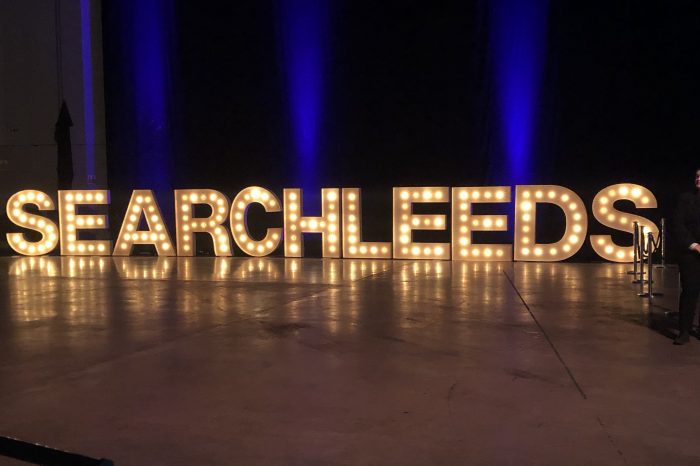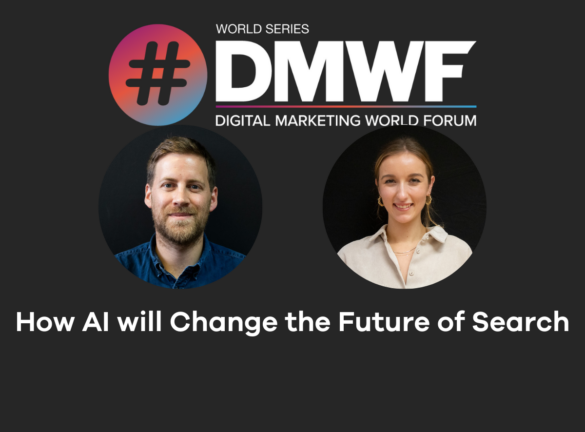
Search Leeds: Key Takeaways Part 2
Sarah Hughes takes us through her key takeaways from Search Leeds, “The North’s Largest Search Conference”, in part two of our mini-series:
1) Kirsty Hulse, Manyminds – How science can help you have better ideas
https://www.slideshare.net/SearchLeeds/searchleeds-2019-kirsty-hulse-how-science-can-help-you-have-better-ideas
Notes:
- Consumer behaviour is constantly changing. A current example is Voice Search. Most recent reports by Rabbit & Pork are here

- Just because we work in tech doesn’t mean we can’t be creative
Encourage creativity in the workplace by creating an environment where colleagues can:
- Work alone to avoid blockers and increase productivity. American Psychological Association found “individuals working separately generate many more, and more creative, ideas than groups. This difference is large and robust”
- Share notes if brainstorming with colleagues. Individuals are less likely to be as critical of or forget their ideas if they write them down. It also reduces occasions the strongest members are relied on or the loudest individual takes over the discussion
- Not be critical or analytical to find ideas. Cast a wide net and validate possibilities later
- Creativity can be learned by practicing exercises which need creativity. Develop a creative process that works for you
2) Bastian Grimm, Peak Ace – Why most SEO audits are SH*T
https://www.slideshare.net/SearchLeeds/searchleeds-2019-bastian-grimm-peak-ace-why-most-seo-audits-are-sht
Notes:
- Provide the right information to clients in the right format
- Tailor each audit by goal, task and recipient
- Give actions with the data, add prioritisation, have a Plan B, and align audit to what the site objective
3) Jennifer Hoffman, DeepCrawl – The business value of SEO
https://www.slideshare.net/SearchLeeds/searchleeds-2019-jen-hoffman-deepcrawl-the-business-value-of-technical-seo
Notes:
- Focus on user journeys and the pain points users encounter
- Convey the impact of speed optimisation in relatable metrics
- Create roadmaps with input from devs and an understanding of their current workflow
4) Matthew Howells-Barby, Hubspot – Everything you need to know before scaling your SEO internationally
https://www.slideshare.net/SearchLeeds/searchleeds-2019-matt-howellsbarby-everything-you-need-to-know-before-scaling-seo-internationally
Notes:
- There are many ways to do international SEO. It depends on your segmentation of the market
- Choose one international SEO strategy and stick to it
ccTLDs (domain.es):
- Large audiences in target countries
- Can support multiple websites
- Can finance local link building campaigns and localised content for each target country
- For increased local sales presence
- For building brand presence across countries
- For tailored product per target country
Subdirectories (domain.com/es/):
- Cannot support multiple sites
- Cannot support local link building
- Same product offering irrelevant of region
- Low costs required
Subdomains (es.domain.com):
- Cannot support multiple ccTLDs
- Tech cannot use subdirectories

- Hreflang
- Required for all international sites. It prevents duplicate content across localised content
- Pages do not need to be an exact translation for hreflang to be added
- Hreflang is only required when you have an alternative version of the page
- On alternate versions of the page use the same hreflang
- Only canonical pages need hreflang (with the exception of AMP)
- X-default directs search engines where the language/country is not specifically listed
5) Fabrizio Ballarini, TransferWise – Building, hacking and killing a bespoke CMS
https://www.slideshare.net/SearchLeeds/searchleeds-2019-fabrizio-ballarini-transferwise-building-hacking-and-killing-a-bespoke-cms
Notes:
- Out of the box CMS doesn’t have enough SEO capabilities
- If tech changes are limited test new page structure and functionality by adapting existing components with API’s
- Once you can prove the new structure works and you have hit scaling issues bring in the developers to automate the process
6) Lukasz Zelezny – The butterfly effect in SEO
https://www.slideshare.net/SearchLeeds/searchleeds-2019-lukasz-zelezny-the-butterfly-effect-in-seo
Notes:
- Look at keywords per URL, rather than URLs per keyword
- Use keywords that are already ranking quite well
- Leverage high quality traffic
- Merge subdomains into subfolders
7) Polly Pospelova, Delete – How to hack rankings with page speed optimisation
https://www.slideshare.net/SearchLeeds/searchleeds-2019-polly-pospelova-how-to-hack-rankings-with-page-speed-optimisation
Notes:
- See Paige’s write up here for How to get a 100% Lighthouse performance score – Polly Pospelova
8) Stephen Kenwright, Rise at seven – Content marketing frameworks that will get you paid more
https://www.slideshare.net/SearchLeeds/searchleeds-2019-stephen-kenwright-content-marketing-frameworks
Notes:
- We focus on what is said, to whom, in what channel
We also need to focus on who is saying it and what the effect is - There’s no limit to the amount of content we can upload but what is the expiry date of this content? Is there a point where it can be reviewed and tweaked?
- Always consider how you can extend the life of your content to get more from your investment
- Keep in mind Google will change their understanding of keywords intent by seasonality
- In many cases users want options and to make the decision (e.g. when searching for the best car they should be presented with options from all categories – small, hatchback, SUV, minivan, etc)
- Humanise your recommendations. “Journalists read your story with their left brains. Deciding if it will get into their audience’s right brains”
9) Shyam Dattani, Searchmetrics – Search, the easy way: The content sales-person analogy explained
https://www.slideshare.net/SearchLeeds/searchleeds-2019-shyam-dattani-searchmetrics-search-the-easy-way-the-content-salesperson-analogy-explained
Notes:
- Optimise sites for users which in turn optimises sites for Google
- To be user-centric focus on:
- What does the user want?
- How are they searching?
- How can I serve content to best meet 1 and 2?
- Google’s R&D – If they rank – It works
- Answer the questions – Content salesman
- Sell, upsell, cross-sell
10) Barry Adams, Polemic Digital – JavaScript is ruining the web (and I love it)
https://www.slideshare.net/SearchLeeds/searchleeds-barry-adams-javascript-is-ruining-the-web-and-i-love-it
Notes:
- The web is getting slower
- JavaScript is a solution but we need a better one
- JavaScript should be used with caution. Keep requests and size to a minimum
The main takeaways from this conference are:
- Work with developers to plan how and when changes can be made
- Keep seasonality in mind for results and keyword targeting
- Continue making sites faster






